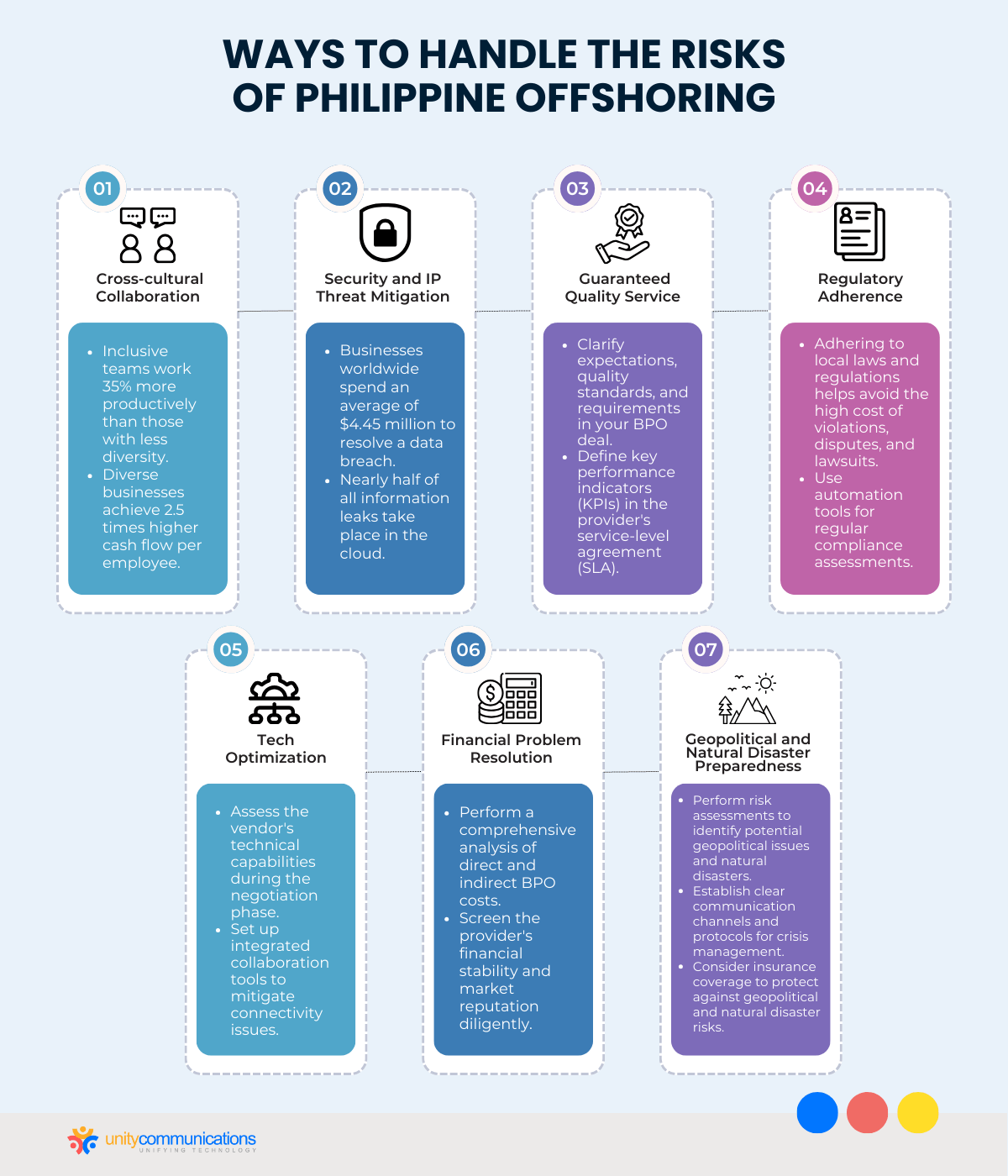Table of Contents
Organizations constantly seek ways to boost operations and reduce costs to compete with the global market. One such strategy is to hire an offshoring provider in the Philippines. This practice lets companies access a larger talent pool for affordable fees.
Like any business investment, delegating functions to Filipino providers comes with critical challenges. It requires careful planning, thorough decision-making, and proactive management.
To ensure long-term benefits with your potential service vendor, let us explore the risks of offshoring to the Philippines and ways to address them.
Seven Challenges Surrounding Philippine Offshoring

Cost efficiency and talent optimization mainly drive companies to adopt business process outsourcing (BPO) in the Philippines. Entrusting non-primary tasks to Filipino providers lets companies focus on improving their products, service offerings, and core competencies.
However, note that benefits are not immediate when outsourcing to this Southeast Asian country. Expect to encounter significant challenges that may negatively impact your business.
Understanding the risks of offshoring to the Philippines is crucial. It helps you prepare for issues that can impede your continuous growth. Anticipate facing these common problems when looking for or working with a Filipino BPO firm.
1. Cultural and Linguistic Differences
Cultural and language disparities challenge communication, coordination, and work alignment. You must exert extra effort to bridge the gap created by having different cultural norms, time zones, and languages as your providers. You must understand these issues to start addressing diversity:
- The work practices and policies in your home country and the Philippines differ. Mismatched work strategies, hierarchical structures, decision-making processes, and time management techniques lead to conflicts and inefficiencies.
- Differences in language hinder clear and effective communication. English is widely used in the country. But variations in accents, vocabulary, and idiomatic expressions cause misunderstandings. This gap is especially problematic when acquiring customer service outsourcing in the Philippines.
- Cultural nuances influence how individuals respond to authority and feedback. Workers from different backgrounds might hesitate to express their opinions, blocking transparent communication.
- The diverse perception of time and urgency impacts teamwork and productivity. Some cultures emphasize a fast-paced work environment. Others prioritize relationship-building, long-term planning, and quality service delivery.
- Understanding non-verbal cues is challenging when interacting remotely. Video conferencing tools help bridge this gap. However, the inability to grasp body language and gestures through devices might result in misinterpretations.
2. Data Security and Intellectual Property (IP) Risks
Outsourcing to the Philippines involves data security threats and IP issues. Because most transactions happen online, you risk exposing your sensitive information to cyberattacks.
IP breaches are also possible if you just let your BPO partner use your data without a formal confidentiality agreement. Hence, you must strengthen your protection to avoid the costly risks of offshoring to the country. Start by studying the challenges below.
- Unauthorized access and data breaches. Insufficient and unaligned information security solutions cause unlicensed data access and information leaks. Such incidents lead to identity theft, reputational damage, and legal consequences.
- IP rights infringement. Without proper safeguards, your product’s IP is at risk of unauthorized use and replication. Compromised proprietary information, trade secrets, and patents severely affect your competitiveness and brand image.
- Data privacy issues. Inadequate adherence to local and international data privacy laws, such as the General Data Protection Regulation (GDPR), results in penalties and legal disputes. This issue also causes reputational damage for both parties.
- Insider threats. Engaging a remote team from the Philippines introduces the risk of insider threats if you do not set good boundaries. Although rare, offshore workers may intentionally or unintentionally misuse sensitive data.
- Unmatched information security practices. Misaligned cybersecurity measures between you and your BPO partner obstruct collaborative work. This problem results in delayed projects, high mitigation fees, and low trust ratings for both teams.
3. Quality Control and Service Delivery Issues
You might struggle to maintain consistent product and service quality when offshoring to the Philippines. Diverse and mismatched work practices, quality assurance measures, and performance metrics lead to conflicts, slow customer responses, and prolonged deliveries.
Anticipate the issues below if you do not align quality control and service delivery measures with your BPO partner.
- The provider has quality standards and expectations that differ from yours. Inconsistencies in product and service conditions arise due to varied business strategies, cultural factors, and operational requirements. Misalignment results in customer dissatisfaction, rework, and strained collaboration.
- Monitoring work quality remotely is more challenging than on-premises. Identifying and mitigating quality control issues might take longer. The lack of direct supervision and real-time visibility into the outsourced processes causes the problem.
- Differences in work processes impact cooperation and service delivery. Service vendors follow project management approaches unique to them. If these processes are incompatible with yours, the joint effort might encounter inefficiencies, delays, and low-quality outcomes.
- Unclear metrics equal inaccuracies when evaluating the BPO team’s performance. The lack of agreed-upon key performance indicators (KPIs) might result in third-party workers not meeting your desired goals.
4. Legal and Compliance Challenges
Legal and compliance challenges are among the substantial risks of offshoring to the Philippines. You must understand Philippine laws and regulations to ensure compliance and avoid legal repercussions.
Remember, different labor laws, tax regulations, IP rights, and contractual obligations create complexities in understanding and complying with local requirements. Misinterpretation and non-adherence result in legal disputes, penalties, and reputational damage.
Negotiating contract terms and conditions with your potential Filipino service provider could also involve issues. Misconceptions due to varied legal terminologies and jurisdictional differences may arise. Thus, you need to be keen on details and seek legal expertise to ensure the agreement protects the interests of both parties.
Furthermore, the country’s legal and regulatory landscape constantly evolves. Policy changes and new laws take effect over time. Partnering remotely with your provider might hinder your ability to keep up with these shifts and ensure ongoing compliance. Failure to adapt leads to legal risks and disruptions in your BPO arrangement.
5. Infrastructure and Technological Limitations
While the Philippines has developed robust infrastructure and technological capabilities, offshoring risks remain. The gaps enumerated below can impact your operational efficiency if you do not verify the effectiveness of your provider’s equipment.
- Internet service may be less reliable or slower in some areas of the Philippines. Expect communication disruptions, data sharing delays, and remote work interruptions, particularly for bandwidth-intensive tasks.
- Specific locations in the Philippines experience power outages or fluctuations. Unplanned blackouts in your provider’s area negatively affect your operations. This issue also causes data loss and slows your offshore team’s progress.
- The availability and accessibility of modern infrastructure vary nationwide. Some places, especially rural ones, may not have access to state-of-the-art equipment and specialized tools. This can make your Philippine BPO team inefficient and incapable of meeting deadlines.
- Compatibility issues impede integration with your provider’s existing systems. Diverse software versions, security protocols, and servers hinder seamless coordination between your in-house and third-party teams.
6. Financial Problems
Although Philippine outsourcing brings significant cost savings, financial problems still occur. The following risks of offshoring to another country distort your well-planned BPO budget, affecting resource allocation for your core competencies.
- Currency exchange rate fluctuations. Outsourcing costs increase if your home country’s currency weakens against the Philippine Peso. Exchange rate volatility adds uncertainty to your financial planning and budgeting for BPO services.
- Cost overruns and hidden expenses. These expenditures include additional recruitment, training, infrastructure setup, and system maintenance fees. Failure to foresee and manage these costs impairs your finances.
- Pricing and contract negotiations. Misalignment in pricing expectations, scope definitions, and cost structures causes disputes and discrepancies. Vague contract terms and conditions lead to difficulties in adjusting prices whenever necessary.
7. Geopolitical Risks and Natural Disasters
The Philippines has geopolitical risks and natural disasters that significantly impact business operations. Geopolitical factors such as political instability, changing government policy, and social unrest hamper productivity.
Sudden regulatory shifts, changing political landscapes, and strict trade restrictions require you to adapt to evolving BPO compliance requirements. These changes disrupt established processes and collaboration models. Implementing the necessary adjustments may cause slower operations.
The country is also prone to natural disasters like typhoons, earthquakes, and volcanic eruptions. These natural calamities negatively impact your provider’s infrastructure, power supply, and networks. Expect system downtime, project delays, and communication challenges with your provider during these occurrences.
Ways to Handle the Risks of Philippine Offshoring

Addressing the risks of hiring a Filipino BPO firm demands a proactive approach. Understanding potential challenges helps you develop and implement effective solutions to ensure a successful offshoring experience. Examine the best practices below to balance the pros and cons of outsourcing to the Philippines.
Strategies for Cross-cultural Collaboration
Research and Markets’ report states that inclusive teams work 35% more productively than units with less diversity. The organization added that diverse businesses achieve 2.5 times higher cash flow per employee.
To experience similar results, execute the following strategies to mitigate cultural and linguistic barriers when employing Filipino offshore workers:
- Promote cultural sensitivity and awareness. Help your BPO partner host virtual training and education programs for third-party team members. Exchange necessary materials that detail the cultural nuances of your home country and company.
- Establish clear and open lines of communication. Encourage workers to ask questions, seek clarifications, and share insights. Using cloud-based omnichannel platforms ensures real-time and seamless interactions.
- Build relationships and trust with your BPO team in the Philippines. Regularly schedule virtual meetings and workforce engagement activities, especially when signing a long-term agreement. This approach helps overcome communication barriers and foster collaborative environments.
- Embrace adaptability and flexibility when partnering with a Filipino BPO firm. Be open to various work styles, problem-solving methods, and feedback mechanisms. Match your strategies with those of your provider to attain mutual learning and growth.
Measures for Security and IP Threat Mitigation
According to IBM, businesses worldwide spend an average of $4.45 million to resolve a data breach. The company labels stolen credentials as the most common cause of a data breach and the incident that took the longest to identify. Nearly half of all information leaks take place in the cloud.
As mentioned, joining forces with a Philippine service provider involves communication through cloud-based platforms. Thus, follow these tips to help combat the security and IP risks of offshoring to the country.
- Conduct due diligence. Carefully assess your potential BPO partner’s data and IP protection practices. Perform frequent audits, request certifications, and review its track record in handling sensitive information and IP.
- Align confidentiality and non-disclosure agreements (NDAs). Negotiate and finalize NDA terms and conditions with the service vendor. Such deals must outline strong confidentiality, IP, and data security. Also, clarify responsibilities, obligations, and consequences for both parties in the event of breaches.
- Implement secure methods for data transfer and storage. Encrypted communication channels, or virtual private networks (VPNs), help safeguard shared information. Enable restricted access and proper backup measures to ensure secure data repositories.
- Execute robust security measures that adhere to local regulations. These approaches include data encryption, remote access controls, and multifactor authentication. Be sure that such practices meet the country’s data protection rules.
- Perform regular audits and compliance assessments. This action assures that your provider maintains robust security measures and complies with relevant data privacy regulations. Audit results detect vulnerabilities and show areas for improvement.
- Host employee awareness and training. Do not let the risks of offshoring prevent you from working with a third-party team. Support your Filipino BPO unit in providing training and awareness programs on data and IP security. This approach helps instill the importance of safeguarding sensitive information and patents.
Approaches for Guaranteed Quality Service
To overcome the challenges discussed in the previous section, consider these best practices to maintain your offshore provider’s quality service.
- Clarify expectations, quality standards, and requirements in your BPO deal. This action ensures mutual understanding between you and your Philippine service vendor.
- Support comprehensive onboarding and training for the offshore team. After signing a deal, provide handbooks to familiarize Filipino workers with your processes, products, and services. Training materials help them adapt to your goals and strategies.
- Define KPIs in your service-level agreement (SLA) with the provider. These metrics should meet your measurable objectives. Regularly monitor and measure performance against these metrics, providing constructive feedback and addressing any deviations promptly.
- Set up a process for continuous improvement and feedback. Establish mechanisms for collecting suggestions and insights from your in-house and third-party teams. Doing so strengthens collaboration and facilitates quality improvements.
Practices for Regulatory Adherence
Adhering to Philippine local laws and regulations helps avoid the high cost of violations, disputes, and lawsuits related to unexpected BPO contract issues. You can address the compliance risks of offshoring to the country in the following ways:
- Work with legal experts as you research and plan your Philippine BPO investment. Conduct in-depth background checks on your potential providers to ensure they follow local policies and procedures.
- Develop comprehensive SLAs addressing key regulatory considerations. Ensure confidentiality, IP protection, and data security in your contracts. Also, remember to include termination clauses and dispute resolution mechanisms.
- Use automation tools for regular compliance assessments. Recent data shows that 44% of managers struggle to manually perform compliance evaluations. So deploy advanced technology when collecting data to quickly validate your BPO partner’s adherence to rules. Also, create a timeline for reporting and addressing legal issues.
Tips for Tech Optimization
The technological risks of offshoring will remain unaddressed unless you verify the effectiveness of your BPO provider’s systems. Use these tips to maximize the provider’s advanced solutions for streamlined processes.
- Assess the vendor’s technical capabilities during the negotiation phase. Pinpoint compatibility issues and coordinate with your potential BPO partner to resolve them. Its systems should help meet your daily operational targets.
- Set up integrated collaboration tools to mitigate connectivity issues. Use secure virtual communication platforms, project management software, and file-sharing systems. These solutions help sustain real-time engagement.
- Identify backup systems to minimize downtime. Such systems include backup power generators, uninterrupted power supply units, and cloud-based storage systems. This leads to continued data accessibility despite sudden interruptions.
- Make sure your provider regularly tracks its tech performance. This step includes monitoring internet connectivity, power supply stability, and overall system performance. Establish clear communication channels for reporting and resolving technical problems.
Techniques for Financial Problem Resolution
In its 2022 survey, Deloitte reported that 57% of executives primarily aim to reduce costs when outsourcing their transactional business activities. However, you might still experience overspending if you do not consider the financial risks of offshoring to the Philippines. Resolve such problems by executing these techniques.
- Perform a comprehensive analysis of direct and indirect BPO costs. Note the possible fluctuations in exchange rates, hidden expenses, and cost contingencies when developing your outsourcing budget.
- Specify pricing models and payment terms for handling cost variations. Prepare a transparent process to efficiently address project scope and cost changes.
- Screen your ideal provider’s financial stability and market reputation diligently. Assess its financial standing, track record, and business history. This way, you can identify and solve financial risks beforehand.
- Establish mechanisms for monitoring the BPO team’s financial performance. Make sure your provider follows contractual obligations and agreed-upon service fees. Frequent tracking helps immediately address any economic issues that may arise.
- Draft contingency plans to mitigate unexpected financial challenges. Maintain contingency funds or explore insurance options to ensure financial protection against unforeseen events.
Methods for Geopolitical and Natural Disaster Preparedness
Geopolitical challenges and natural disasters are among the risks of offshoring to the Philippines that you must urgently address. These issues come and go unexpectedly. Hence, you must prepare a plan to ensure smooth operations during emergencies. Consider these simple ways to guarantee your geopolitical risk and natural disaster preparedness.
- Perform risk assessments to identify potential geopolitical issues and natural disasters.
- Use the resulting insights to develop a robust business continuity plan.
- Set up backup infrastructure, remote work, and alternative collaboration solutions.
- Establish clear communication channels and protocols for crisis management.
- Notify all stakeholders about potential disruptions promptly.
- Maintain regular interactions and updates to provide reassurance amid crises.
- Consider insurance coverage to protect against geopolitical and natural disaster risks.
- Target policies that offer coverage for business interruptions and property damages.
- Engage with insurance professionals to identify appropriate coverage for your BPO plan.
The Bottom Line

Seeking third-party support from the Philippines involves challenges that impede collaborative efforts with your provider. Cultural, linguistic, and technological barriers hinder seamless remote communication and cooperation. Data security, regulatory, and geopolitical issues also slow your daily operations if not adequately mitigated.
Fortunately, multiple strategies exist to help you address the risks of offshoring to another country. The practical ways detailed above guide you in ensuring smooth processes and quality services amid such issues.
Are you looking for a provider that recognizes and helps solve BPO gaps? Connect with Unity Communications now. The Philippine-based service vendor understands how these challenges affect partnerships. Thus, it implements best practices to minimize their impact on your productivity.




